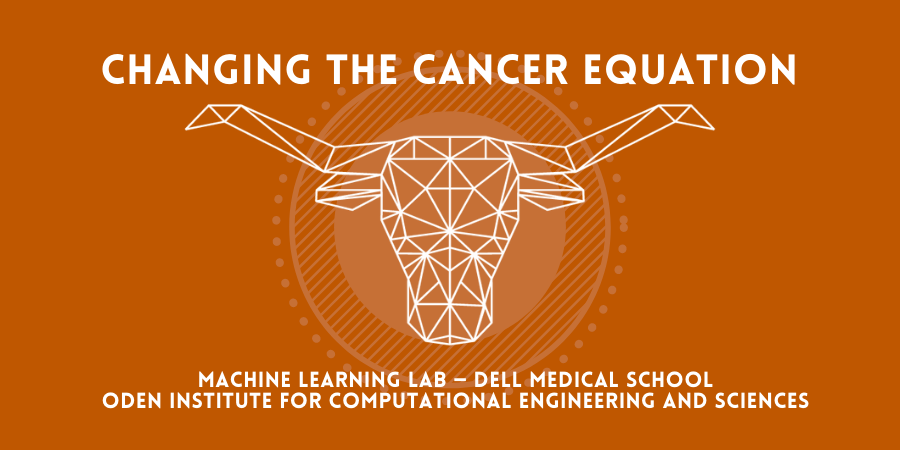Changing the Cancer Equation
UT partnership integrates emerging disciplines of computational oncology and machine learning to transform the future of cancer care.
UT partnership integrates emerging disciplines of computational oncology and machine learning to transform the future of cancer care.

The American Cancer Society estimates that nearly 2 million Americans will be diagnosed with cancer in 2022 and more than 609,000 people will succumb to the disease—that’s roughly 1,670 deaths per day in the United States alone.1 As nearly 40% of the population will be diagnosed with cancer at some point during their lifetimes, it is perhaps the greatest health care challenge facing modern society.
Over the last five decades, remarkable clinical advances have substantially reduced the mortality rate for cancer survivors, yet half of those diagnosed with the disease still die within ten years.2
An innovative partnership between The University of Texas at Austin’s Machine Learning Lab, Oden Institute for Computational Engineering and Sciences, and Dell Medical School aims to do better—much better.
Their focus is to integrate two emerging disciplines—computational oncology and machine learning—to transform the future of cancer care. Machine learning applies algorithms to large data sets to build classifiers that can make accurate predictions, even in complex biological and chemical domains. Computational oncology uses physics-based and data-driven advanced mathematical and computational approaches to model tumors, calibrate patient-specific models, and simulate patient responses to potential treatment options. Modeling and simulation occur across a spectrum of scales—from the cellular level to the organ level of the human body. The models can be theory-driven, knowledge-driven, data-driven, or, increasingly, a combination of all three. Substantial computational skills and capabilities, as well as medical knowledge, are required to capture the individuality of each cancer patient’s situation for accurate decision making at all levels.
Breakthrough Vision
The interdisciplinary research collaboration was established through a $10 million leadership gift from Dheeraj and Swapna Pandey. UT Austin is uniquely positioned to advance computational oncology through the breadth and depth of expertise on campus in computational science, machine learning, and clinical and medical research. The Oden Institute, Machine Learning Laboratory, and Dell Med will begin a new collaboration that accelerates the delivery of high-impact work that advances the ability to model and predict cancer, imagines new computational tools to aid diagnosis and decision-making, and translates research into improved patient outcomes.
“UT Austin has a unique environment that enables the interdisciplinary research critical to tackling societal grand challenges such as personalized care for cancer patients,” said Karen Willcox, Director of the Oden Institute for Computational Engineering and Sciences. “We are so thrilled to have this opportunity to build a new partnership with the Machine Learning Lab, building on the Oden Institute’s strength in computational oncology and our existing partnerships with Dell Med, MD Anderson Cancer Center and the Texas Advanced Computing Center. Computational medicine is a top priority for the Oden Institute and the generosity of the Pandey family is a gamechanger in taking our efforts to a new level.”
The gift forges deeper ties between two of the university’s core computational units. The Oden Institute and its Center for Computational Oncology sit at the forefront of developing mechanism-based modeling techniques that optimize treatment and outcomes for an individual patient. The recently established Machine Learning Laboratory is the university’s headquarters for machine learning and artificial intelligence. “A new wave of machine learning is creating predictive models that are transforming science,” said Adam Klivans, Director of the Machine Learning Lab and NSF-funded Institute for Foundations of Machine Learning. “Our technologies can anticipate new biological and chemical interactions to advance the automated discovery of new treatments.”
Currently, cancer biologists and chemists rely on trial and error to determine what treatments will be most effective. “Advances in a subfield known as deep learning will dramatically speed up this process,” added Klivans. “What would have previously taken years in the lab can potentially be accomplished in days with the appropriate computing simulations.”
Research Reaching Patients
Connecting university research with community providers is central to the mission of Dell Med. Through initiatives such as the Livestrong Cancer Institutes, Dell Med translates leading-edge research into high-quality clinical trials and patient-focused precision medicine.
"Time is critical when treating cancer,” said Gail Eckhardt, Director of the Livestrong Cancer Institutes at Dell Med. “The Pandeys’ gift brings us that much closer to the day when clinicians and researchers can integrate patient data and computational methods to individualize therapy, thereby improving the lives of patients with cancer.”
“Computational approaches are the key to accelerating progress against cancer,” said David Jaffray, Ph.D., Chief Technology and Digital Officer at The University of Texas MD Anderson Cancer Center. Widely regarded as one of the world’s leading cancer research institutions, MD Anderson has an ongoing collaborative partnership in oncological data and computational science with the Oden Institute and UT Austin’s Texas Advanced Computing Center. “This investment will further the collaborative, team science approach we have developed with the leadership at UT Austin,” added Jaffray. “Together, we are building a critical mass of talent to use the power of data and computing to make real progress against this terrible disease.”